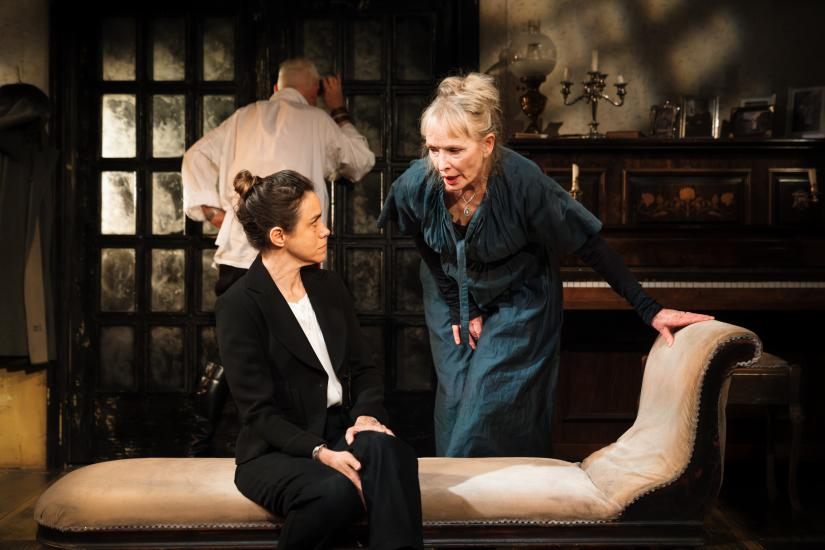Cambridge Arts Theatre, Cambridge – until Saturday 18th June 2022
Reviewed by Steph Lott
3***
This new revival of August Strindberg’s absurdist play The Dance of Death sees real-life spouses Hilton McRae and Lindsay Duncan play Edgar and Alice, a couple stuck in a bitter marriage for 30 years. As their anniversary approaches, the couple isn’t much looking forward to it. Alice is all for ignoring it, and Edgar says it doesn’t matter as they’ll be dead soon anyway.
This isn’t a comedy although you will laugh at some of the things they say to each other. Your reasons for laughing will however vary. The relationship seems warm at first but then it becomes uncomfortable as you get drawn further and further into their troubling, toxic dynamic. Initially, it seems as though they are deeply fond of each other, but have just fallen into a habit of poking and teasing which has become extreme and vicious, perhaps caused by their isolation on an island where no-one seems to like them. But when Alice’s cousin Katrin (Emily Bruni) arrives (rewritten by Oscar-winning writer Rebecca Lenkiewicz from Strindberg’s male cousin, Kurt), the presence of an outsider, albeit one who has a history with the couple, means the more sinister and twisted games begin. The audience tries to work out Edgar’s and Alice’s stories; is Edgar really a vampiric despot as Alice claims, or is his bluster only concealing his fear of illness and death? Who is telling the truth?
I wanted to like this play more than I did, but sadly this production of Strindberg’s study of marital decay is somewhat uninvolving and doesn’t achieve the sense of horror and damnation that is alluded to but not quite reached.
The tone of The Dance of Death is mystical; there are however some contradictions which are distracting and confusing, and prevents the audience from becoming as caught up as they should in the story. The language is very 21st century with plenty of swearing. Edgar’s uniform and the use of a telegraph would suggest early 20th century and the play’s critique of laws around divorce and child custody has dated, although the central conceit of two people tied in mutual co-dependence, and destruction, has not. Alice and Katrin’s dresses could have been ordered online from somewhere. So where in history are we? Is it supposed to be timeless?
I think if the setting and context could have been more anchored then there would have been less to distract from the themes of the play itself, which are rich and reminiscent of Sartre and Beckett, although it predates those works. Hell is indeed other people, and if you are isolated on a remote island with a storm raging, what choice is there but to carry on?
I did however find the set, the lighting and the music fabulous; a menacing disturbing backdrop to the play. Designer Grace Smart reflects the protagonists’ claustrophobic marriage in a distressed-looking parlour in an isolated island military fortress. I loved the dark and sombre colours. David Howe’s lighting design is excellent and Kristina Arakelyan’s music and Dan Balfour’s sound are haunting.
It is a shame that this production does not quite deliver, especially given the talent in its cast and an Oscar-winning writer in Lenkiewicz. The vicious marital conflict and its miserable claustrophobia are quite nicely played but everything is oddly flat.

